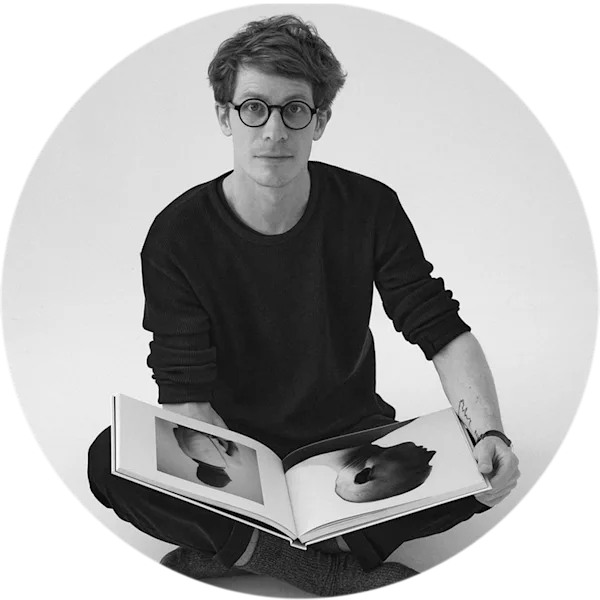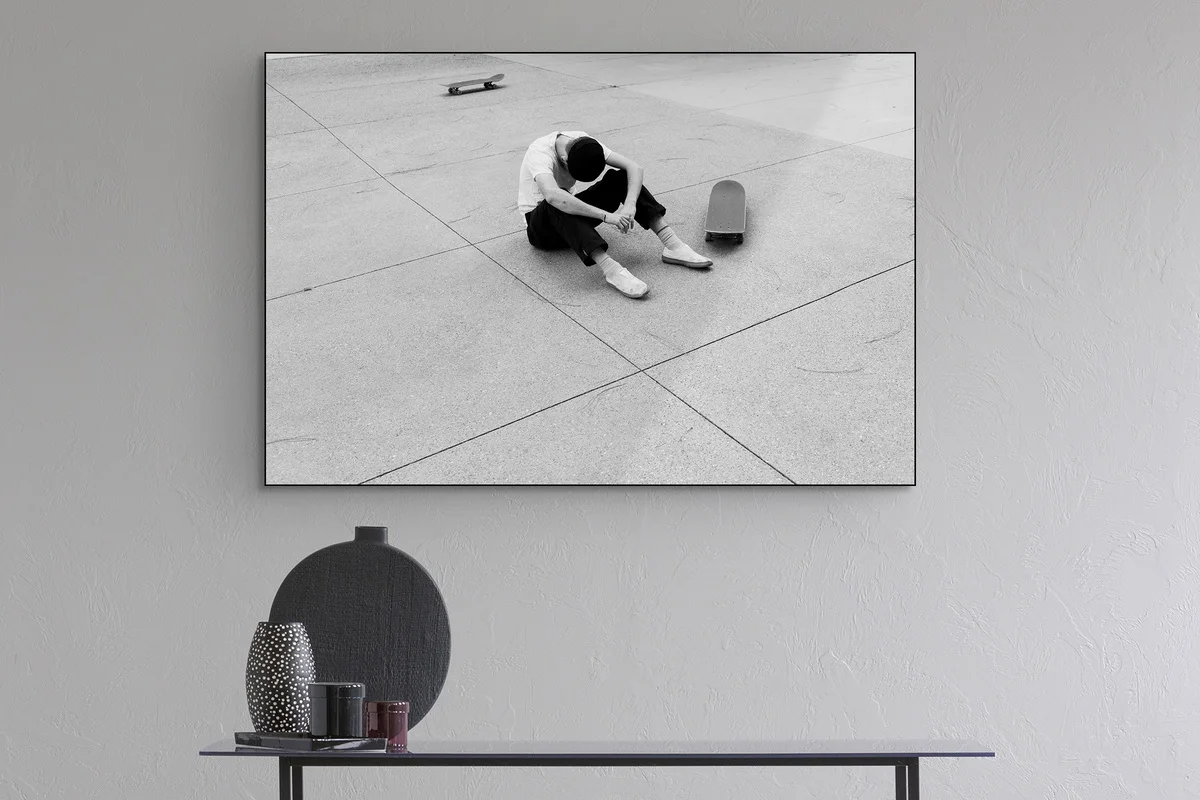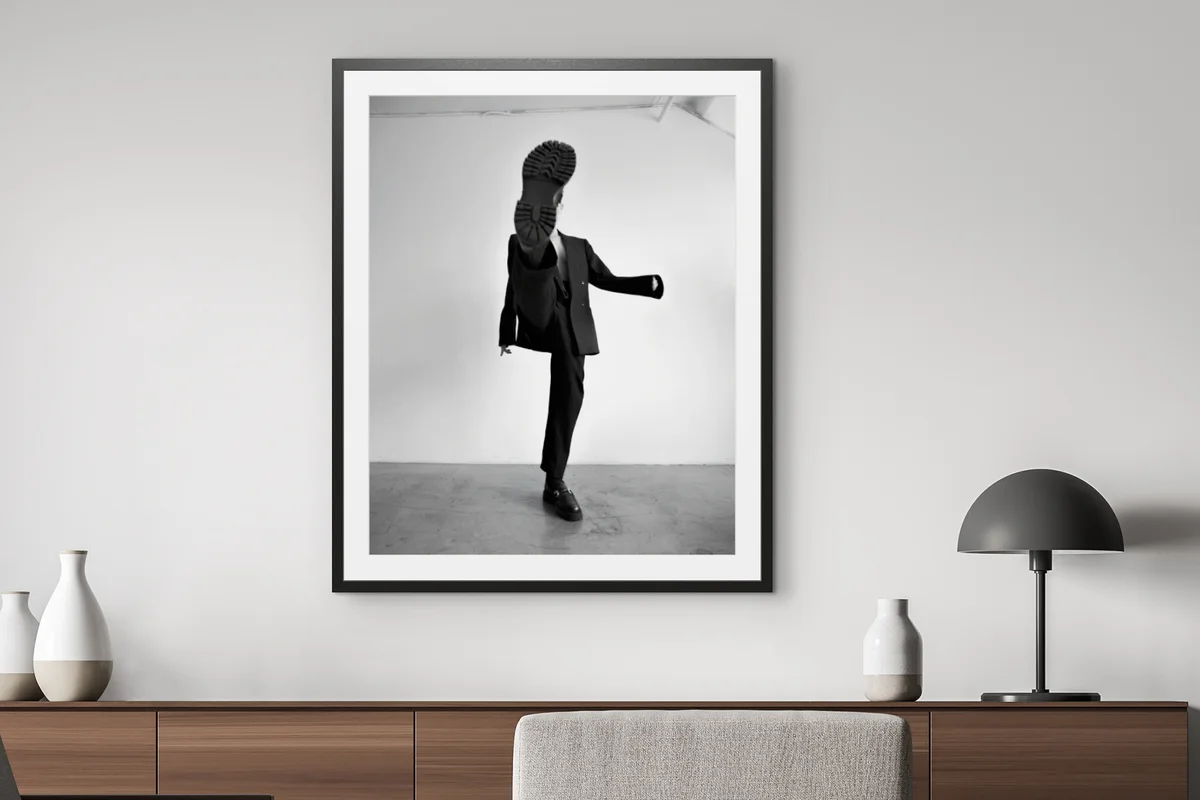The world of black and white with Alexandre Souêtre
Alexandre Souêtre
Alexandre Souêtre, born and raised in Paris, is a photographer, brand consultant, and art director currently living in Los Angeles, Paris, and Portland. His photographs have appeared in numerous magazines. In this interview, he talks at length about his fascination with black and white photography and why it is so much more to him than "just" images without color.
"When I look at a black and white photo I‘ve taken and I think about the colors that existed within that world to begin with, then I feel like I haven't gone to the right point of how it should look."

"There is something soft, bittersweet about black and white photography." – Alexandre Souêtre

Photo: Alexandre Souêtre // Ilford B/W Photo Print With ultraHD Sharpening Under Acrylic Glass and Slimline Case in Black
How would you describe your photography?
I think it's hard to describe your own photography because most of the time photographers tend to be the least reliable person to speak about their own work. I think you get a better idea from other people's impressions, but in my sense is that I think I treat photography with more of an almost graphic and compositional approach than I do, more pragmatically speaking.
So I tend to be a little bit more concerned with visual impression over storytelling. I think I would describe my photography as at least the way I shoot photos with more of a graphic design composition-based approach than I do a more pragmatic approach. Meaning I think I tend to be more focused on composition and the impression, the visual impression, that the viewer might get from that as opposed to the storytelling aspect of photography.
Why do you photograph in black and white?
I photograph in black and white because I think it offers a slightly different experience to the viewer, and it's pretty exciting for me to take that approach, because if I think about colors, which I also really appreciate, they can be really powerful in conveying emotions, but then they kind of work individually. When you look at black and white, you start losing sense of that and it offers a different point of view on a scene or a subject for the viewer who's consuming the photographs.
What is black and white photography all about for you?
I think black and white photography, especially when it comes to analog photography, is about the details, it’s about how intricately you can ook at, for instance, a type of film and the camera that you're going to use it with and see the result, which initially seems very, very minor and almost hard to perceive. But the more you shoot photography, the more you start noticing the way certain types of black and white film behave. And it gets very interesting. And this is just a first step. And then it's once you start scanning the work and processing it and working with it, you realize that black and white photography is a lot richer than you might anticipate it to be to begin with. Black and white photography, for me is all about the details and how intricate you can get with the process from the film stock that you might pick to the camera that you're going to use it with.
Do you miss colors when you look at your black and white photograph?
The subject matter all the way to the printing process and seeing how many times you can fine tune that process is very exciting. I don't think I miss colors when I look at my black and white photography in general because, and I think that applies to good black and white photography, when you look at it, you should almost forget that colors are in there to begin with.
What emotions does a black and white photo evoke in you?
It kind of shifts that focus from a world of color, if that makes sense. So if I look at a black and white photo that I've taken and I think about the colors that existed within that world to begin with, then I feel like I haven't gone to the right point of how it should look. It's a bit cliche, but black and white photography to me evokes a moment suspended in time, which in a sense is the timelessness that you get from it.
And from that, what I really like about black and white photography is it's a great tool to convey very subtle emotions, like something slightly dark and ominous. But on the other side, also something a bit soft and bittersweet. And it's a palette that's very interesting to play with in photography. There are more photographers that inspire me that I can think of, and honestly, most of them are in some way anonymous to me because I think I'm exposed to a lot of photography and a lot of them have a really good impression on me.
Are there photographers that inspire you in particular?
But I find that there is a good deal of overlap between art and media. And I find that inspiring, whether that be music, graphic design, cinematography, in many ways, I think they can inspire someone into photography. As far as I'm concerned, I would say directors such as Chris Cunningham or comic illustrators such as Marcel Gottlieb have probably inspired me in my own photography work, probably subconsciously.
"I believe that photography was always meant to be printed. In many ways, it is not complete until it is." – Alexandre Souêtre
Do you think or see in black and white while working with your camera?
I don't think I think or see in black and white when I shoot photography that's intended to be in black and white, but I probably do by extension, because I think I tend to focus on the subject almost in a way where color hues become shades.
Do you think about printing when you start working?
I don't often think about printing when I shoot photos, but I think it's a consequence of today's reality because it's a bit hard to afford to be able to think constantly about that. But if you start thinking about printing, when you shoot photos, it becomes very exciting because it offers a much richer way to have viewers consume your work.
And there is a whole process in between that might get you excited while you're shooting photography. I do think about printing when I start working, when I start shooting photos, but I often view it as almost a more intimate form of consumption because today's reality has become a lot more about digital consumption. It's usually quicker, it's usually smaller and but that but that all together almost elevates printing because it feels like a very special way of showing your work and sharing it and having people consuming it.
Mainly because from my perspective, I feel the same way about consuming photography in general. And keeping that insight while shooting or working that your work might be consumed, printed on a wall or in a book is very exciting. The reality of today's consumption is a little bit more digital, quicker and smaller, but in many ways it elevates printed work because it has that much more of a special experience for you as an artist, but for the other people, as a consumer, and keeping that insight when working or shooting, at least for me, is a very exciting experience.

Photo: Alexandre Souêtre // Canson Baryta Prestige II and Hamburg Frame in Black With Passe-Partout
Which technique do you love the most when it comes to black and white photography?
To be honest. I'm not a very technical photographer. I've never been a very technical photographer. I didn't go to school for photography. I fell into it letting my instincts guide me. And I think in many ways I have the same approach when it comes to the way I'm going to shoot black and white photography and the way I'm going to process it and work on it and post.
And I think often the subjects, the composition and the overall mood that you get out of a setting in which you shoot photography tends to have an impact on how the black and white is going to feel in the end.
If you had to choose one photograph, which would you choose?
There is a photo that I shot about two or three years ago that has been feeling pretty special to me and and especially looking back at it again and again, it keeps kind of intriguing me more so than other photos that I've shot, mainly because there is something, again, almost design in the composition about it, the shapes, the shading, the position of the subject.
And in many ways the way the way she chose to express herself, the way she chose for it to be framed because she angled herself, I think becomes a to me, a very interesting subject, because I realized looking at it from afar or up close, you get a very different experience. But either way, it kind of makes you want to keep looking at it and you keep finding very minor details. There's a little bit of hair showing on one side. There are a lot of textures. There are some shadings in the corners. I think it's interesting when you start drawing the eyes towards the corners sometimes as opposed to the center. And so, I think in many ways this photo feels like me. It feels like what I shoot, but it also feels like something very different. And it might be a happy accident, but I mean, it is a photo that I've been feeling pretty happy about.
What does printing your work mean for you?
Printing your work as a photographer is probably the greatest accomplishment. In many ways it feels like a completion, and I think it is a completion. I think photography was always meant to be: printed. Now we've maybe found other ways to consume it, but ultimately that's where it belongs. Whether it's in a book, whether it's on a photo paper, in a gallery, on the wall or in someone's home.
That's where photography belongs. When it comes to configuring photos on the wall, I tend to look at it in a more spatial layout way. I think in many ways, seeing photos on the wall from the corner of your eye or even looking at photos unintentionally while focusing on another subject is just as important as it is when you are actually intentionally observing a photo.
And so I think about it as something in the background just as much as I do in the foreground.
Which requirements do you have to an image when you configure a picture for your wall?
When it comes to configuration for photography on the wall, I think it's very useful to have any kind of tool that gives you the ability to preview it the way it's going to be framed and the way it's going to be placed, because it's often something that we have a hard time picturing with photography ahead of time and when you look at something that feels right, you just know right away there's no hesitation.






